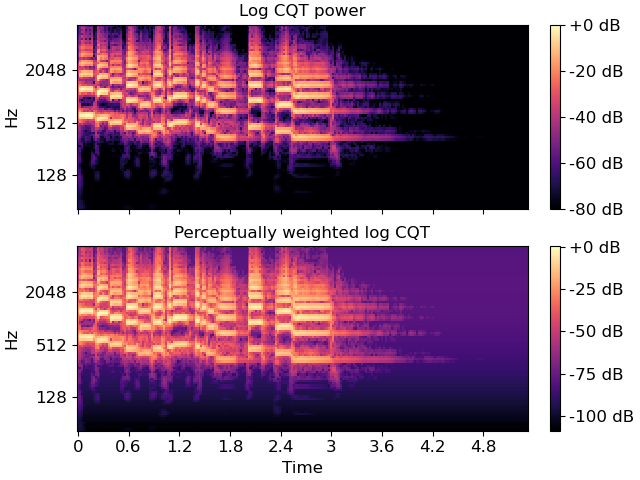Caution
You're reading an old version of this documentation. If you want up-to-date information, please have a look at 0.9.1.
librosa.perceptual_weighting¶
- librosa.perceptual_weighting(S, frequencies, *, kind='A', **kwargs)[source]¶
Perceptual weighting of a power spectrogram:
S_p[..., f, :] = frequency_weighting(f, 'A') + 10*log(S[..., f, :] / ref)
- Parameters
- Snp.ndarray [shape=(…, d, t)]
Power spectrogram
- frequenciesnp.ndarray [shape=(d,)]
Center frequency for each row of` S`
- kindstr
The frequency weighting curve to use. e.g. ‘A’, ‘B’, ‘C’, ‘D’, None or ‘Z’
- **kwargsadditional keyword arguments
Additional keyword arguments to
power_to_db.
- Returns
- S_pnp.ndarray [shape=(…, d, t)]
perceptually weighted version of
S
See also
Notes
This function caches at level 30.
Examples
Re-weight a CQT power spectrum, using peak power as reference
>>> y, sr = librosa.load(librosa.ex('trumpet')) >>> C = np.abs(librosa.cqt(y, sr=sr, fmin=librosa.note_to_hz('A1'))) >>> freqs = librosa.cqt_frequencies(C.shape[0], ... fmin=librosa.note_to_hz('A1')) >>> perceptual_CQT = librosa.perceptual_weighting(C**2, ... freqs, ... ref=np.max) >>> perceptual_CQT array([[ -96.528, -97.101, ..., -108.561, -108.561], [ -95.88 , -96.479, ..., -107.551, -107.551], ..., [ -65.142, -53.256, ..., -80.098, -80.098], [ -71.542, -53.197, ..., -80.311, -80.311]])
>>> import matplotlib.pyplot as plt >>> fig, ax = plt.subplots(nrows=2, sharex=True, sharey=True) >>> img = librosa.display.specshow(librosa.amplitude_to_db(C, ... ref=np.max), ... fmin=librosa.note_to_hz('A1'), ... y_axis='cqt_hz', x_axis='time', ... ax=ax[0]) >>> ax[0].set(title='Log CQT power') >>> ax[0].label_outer() >>> imgp = librosa.display.specshow(perceptual_CQT, y_axis='cqt_hz', ... fmin=librosa.note_to_hz('A1'), ... x_axis='time', ax=ax[1]) >>> ax[1].set(title='Perceptually weighted log CQT') >>> fig.colorbar(img, ax=ax[0], format="%+2.0f dB") >>> fig.colorbar(imgp, ax=ax[1], format="%+2.0f dB")
